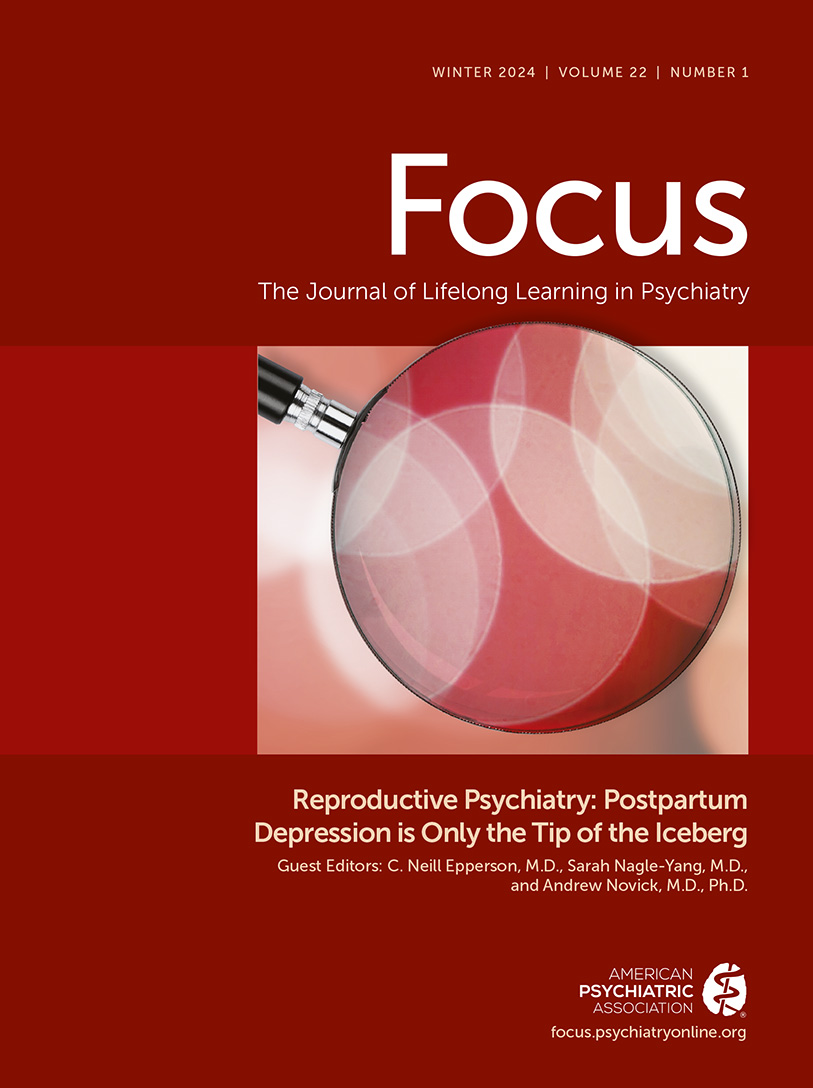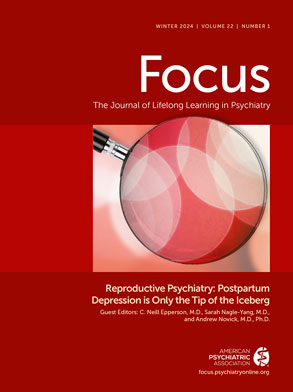An Overview for the General Psychiatrist Evaluating Patients With Obstetric and Neonatal Complications and Perinatal Loss
Abstract
BOX 1. Psychological responses to trauma—terms and definitions
Clinical Context
Screening for Psychiatric Consequences of Obstetric and Neonatal Complications and Perinatal Loss
Special Populations and Considerations With Obstetric and Neonatal Complications and Perinatal Loss
Infertility and recurrent pregnancy loss.
NICU hospitalization.
Black, Indigenous, people of color (BIPOC) communities.
LGBTQ+ communities.
Treatment Strategies and Evidence of Obstetric and Neonatal Complications and Perinatal Loss
Immediate Management: Trauma-Informed Care, Distress Management, and PTSD
Expanded Workforce to Support Patients During the Perinatal Period
Care Delivered in the NICU Setting
Screening Parents From BIPOC Communities
Screening Parents From LGBTQ+ Communities
Preventive Interventions and Proactive Consultation
Pharmacologic Considerations
Questions and Controversy Related to Obstetric and Neonatal Complications and Perinatal Loss
Maternal Mortality, the Opioid Epidemic, and Maternal Mental Health
Impact of Changes in Reproductive Rights on Management of Perinatal Complications, Loss, and Reproductive Decision Making
Recommendations for General Psychiatrists When Caring for Individuals With Obstetric and Neonatal Complications and Perinatal Loss
| Do | Don’t |
|---|---|
| Utilize validated screening tools to identify anxiety, depression, posttraumatic stress disorder | Pathologize normal grief |
| Utilize individual’s preferred language | Automatically refer to delivery as abortion or termination or refer to the baby as demise or fetus |
| Listen to the individual to determine where they are in the grief process | Assume that grieving will follow an expected timeline |
| Have basic knowledge about the grief process after perinatal loss | Offer platitudes such as: “It wasn’t meant to be,” “You’ll get pregnant again,” “At least it was early,” and “I know how you feel.” |
| Have knowledge about state laws and local resources and offer these to patients when appropriate | Attempt to problem solve before the patient is ready; attempt to “fix” the grief |
| Review details related to the perinatal loss before the visit | See the patient without knowledge of the events surrounding the loss |
| Encourage meaning-making activities and rituals when appropriate (letter writing, reproductive narrative, bereavement box, memorial garden, etc.) | Avoid discussion of or processing the loss |
Conclusions
References
Information & Authors
Information
Published In
History
Keywords
Authors
Competing Interests
Metrics & Citations
Metrics
Citations
Export Citations
If you have the appropriate software installed, you can download article citation data to the citation manager of your choice. Simply select your manager software from the list below and click Download.
For more information or tips please see 'Downloading to a citation manager' in the Help menu.
View Options
View options
PDF/EPUB
View PDF/EPUBLogin options
Already a subscriber? Access your subscription through your login credentials or your institution for full access to this article.
Personal login Institutional Login Open Athens loginNot a subscriber?
PsychiatryOnline subscription options offer access to the DSM-5-TR® library, books, journals, CME, and patient resources. This all-in-one virtual library provides psychiatrists and mental health professionals with key resources for diagnosis, treatment, research, and professional development.
Need more help? PsychiatryOnline Customer Service may be reached by emailing PsychiatryOnline@psych.org or by calling 800-368-5777 (in the U.S.) or 703-907-7322 (outside the U.S.).

